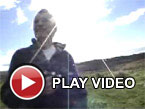For all the words that have been used by myself and others over the years to describe Michael Gira’s music (violent, depressing, glorious, loud, slow, etc.), nothing encapsulates the feeling of this performance like the title of their 1991 album White Light from the Mouth of Infinity. A yawning chasm that invites the listener in to be consumed wholly and utterly before being spat back out into the world feeling new, enlightened and loved. And this was all in the first song.
15th August, The Button Factory, Dublin.
While milling about town before the show, I ended up in a bookshop flicking through various volumes to pass the time. Picking up a compendium of Samuel Beckett’s letters, I found a passage about ballet and its relation to music:
"To represent a piece of music in a particular way, by means of dancing, gestures, settings, costumes, etc., is to degrade it by reducing its value to mere anecdote. There are people who cannot achieve satisfaction unless the can see. As for me, to my misfortune no doubt, I cannot go off unless my eyes are closed."
Then, in David Byrne’s How Music Works, I read of how audiences of serious music became less and less boisterous as stricter rules (both by venues and society) made physical acts of appreciation beyond nodding your head unacceptable:
"One was expected to sit immobile and listen with rapt attention… Serious music, in this way of thinking, is only absorbed and consumed above the neck. The regions below the neck are socially and morally suspect."
These thoughts were running through my mind as Swans opened with what seemed to be a never-ending crescendo, a constant climax which pulsed from the stage with a splendor and power that few other artists are able to match. This is a music that requires no adornment, no garish embellishment and works everywhere from the innermost reaches of the mind out into the multitude of the body’s muscles, causing thoughts and limbs to go into motion. I wonder if Beckett would "go off" in such a situation.
The two hour performance consisted mainly of new material, all sounding like an alchemical blend of the kind of rhythms I would have expected from some of Swans’ funkier works in the 1980s with the cosmic intensity that this latest incarnation has channeled so perfectly. Unlike the visions of the group that have been perpetuated by fans and journalists alike, this was a group of individuals delirious on their music and more than happy to share it. Joking amongst themselves and embracing the audience with total sound (it was almost too much even with ear plugs), this was the best concert I have been to. Possibly ever.
The new songs are a step up from the magnificent work on The Seer with the band all contributing to different, complementary aspects of the sound: Thor Harris and Christoph Hahn create divine drones that would give La Monte Young an erection whereas the rest of the group have developed a euphoric garage rock vibe that is equal parts The Stooges and Crazy Horse (there was even a little bit of The Cramps thrown in as Gira sang the chorus to "Garbageman" at one stage). Yet, it all sounds entirely like Swans. At times they reach a religious fervor with Gira dancing and vibrating like a zealot coming fully under the influence of ecstatic prayer.
The only recognizable song in the set was "The Seer" which has mutated even more since the last tour and studio sessions. It is obvious that this song (and the other similar works on the last album) best represent the group’s head space at this time as the new music could very well have been included as third and fourth discs with The Seer. Sometimes when an artist decides to go for a mainly new set, I do feel a little let down that I never got to hear the songs that I know and love but this was not the case with Swans. Instead, as good as "The Seer" was, I could not help but wonder what would be replacing it as the band played more shows together.
Finally, it would be a crime to finish this review without mentioning Josephine Foster’s magical set earlier in the evening. Playing with the Icelandic cellist Gyða Valtýsdóttir (twin sister of Kristín from Múm); Foster created a weird world, half-lit and hazy, with her delicate songs. Valtýsdóttir’s playing and vocals were a perfect accompaniment to Foster’s haunting voice and spidery guitar work though Valtýsdóttir’s Tim Burton cello waif stage persona was a bit off-putting at first. However, once I got passed that, I got into the vibe Foster and Valtýsdóttir were putting out. Yet, given what would come after they were done, it seems almost cruel to put any band on the same bill as Swans.



